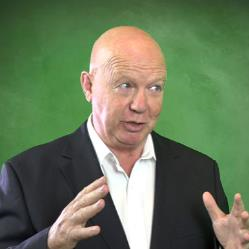 The most common objection when prospecting - Interview by John Smibert.
The most common objection when prospecting - Interview by John Smibert.
 In this interview Dan Symons tells us the number one objection that most salespeople get when prospecting is "We already have a supplier".
In this interview Dan Symons tells us the number one objection that most salespeople get when prospecting is "We already have a supplier".
How many times have you had this one? Does it put you off?
I asked Dan how he suggests we can overcome this objection? Dan says put it on the table right up front before the customer raises it. He coaches us on how to do this.
If you commonly get this objection then this interview will be well worth viewing. As usual Dan provides some great advice.
Dan Symons is a business development professional, an author, a sales mentor and coach.
See more of the 'TALKING SALES' series here
Interview:
John: You know, in prospecting generally you're calling on somebody that's already got a supplier, and they're probably happy with that supplier. 95% of the time the salesperson says "Hey, Mr. Customer - I want to come and talk to you." and the customer says "I've already got a supplier."
Dan: Yes.
John: I know you've got some ideas about how you address that issue, and what the reality is. Can you tell us a little bit about that?
Dan: Yes. To me it's no different than when we walk into a retail store as a consumer, and someone walks up to us and goes "Can I help you?" Most of us will turn around straight away and go "No, I'm just looking thanks" In a business sense often that's the first objection we've got. Sometimes it's sincere, they are in a loving relationship with their current supplier, other times it's a fend off strategy. What I say to a lot of my team that I talk to, and people I talk to, is... If we're talking to the right people, we know this is going to come up as an objection, whether real or otherwise - take it off the table.
John: Take what off the table?
Dan: Take the objection completely off the table.
John: So, how do you do that?
Dan: If you know that you are in a situation where you're going to encounter the objection that "I'm quite happy with my incumbent supplier." Were I to call you, John, I would say "Hi John, Dan from {wherever I happen to be}. Look, I don't have a relationship with you, and I'd really love to come and learn a little bit about your business. I appreciate you are most likely well-loved by your current supplier. But look, I'd sincerely love to come out, have a cup of coffee, and learn a little bit more about your business."
John: Okay, so what are you saying? The response is going to be more inclined to say "yes" on that basis?
Dan: Well, what we've done is remove the one thing that is the most common thing for them to say to us, which is "I'm quite happy with my supplier."
John: So, they've quickly got to come up with another excuse.
Dan: Yes, and you can extend that and go "I expect you to be well-loved by your current supplier." And what that actually does is set two frames of reference. One, it sets the expectation that you believe they should be loved by their current supplier. Two, it reinforces the expectation that you would love them as a customer.
John: I like what you're saying, but I think I'd like to put something on top of that, and that is... If I'm sitting there, saying "Okay, this guy wants to come and meet with me, and he already knows I've got a good supplier, etc. Why should I talk to him?" There still needs to be that hook there, there still needs to be potential value on the table; you've got to give him a reason.
Dan: I guess the tool there is to get past that one objection, to get to the next conversation. Obviously, as we touched on with finding your ideal clients, you'll know why you're ringing them, you'll know what value you can impart. But often that "I'm quite comfortable with my current supplier stymies a lot of salespeople, and they back away from that call, going "Okay. Well, thanks very much!" And they walk away.
John: It's better, as a salesperson, to get that in first, and then put the value on the table.
Dan: Yes, precisely. Then you can actually get that away, and you don't have to fend that objection off, knowing you're getting it. You can then actually go on to talk about why you can make a difference in their business, when you get to know them and see if you both can do business together.
John: Okay. So, what you're saying is that when you make the call then expect you're going to get that raised as a concern, and jump in first with it, and then follow that up with the promise of value, that when you're meeting me you'll get some value out of the meeting.
Dan: Yes. For me it's very much an objection you need to have that response to in your arsenal, because it's the one that will fend you off quickly, and if you don't have a response to it then it can kill a call to a very worthy client quite quickly.
John: Sounds like great advice. Thanks, Dan - I appreciate it!
Dan: Thank you very much!
****************
More of Dan Symons:
***************

Your Invitation: I invite you to join the Sales Leader Forum group on LinkedIn where you can experience informative discussions with your peers and sales thought leaders on subjects like the one we have discussed here. I also invite you to subscribe to the
- Sales Leader Resource Centre here
- Sales Leader YouTube channel here (300+ sales leadership videos)
Please Share: If you valued this article, please share via your Twitter, LinkedIn, Google+ and Facebook social media platforms. I encourage you to join the conversation or ask questions. So feel free to add a comment on this post - I promise to respond. If inclined please follow my LinkedIn post page here.
Want to touch base? If you have questions please feel free to contact me - email: john.smibert(at)salesleaderforums.com, Phone: +61 404857893 or Skype: john.smibert